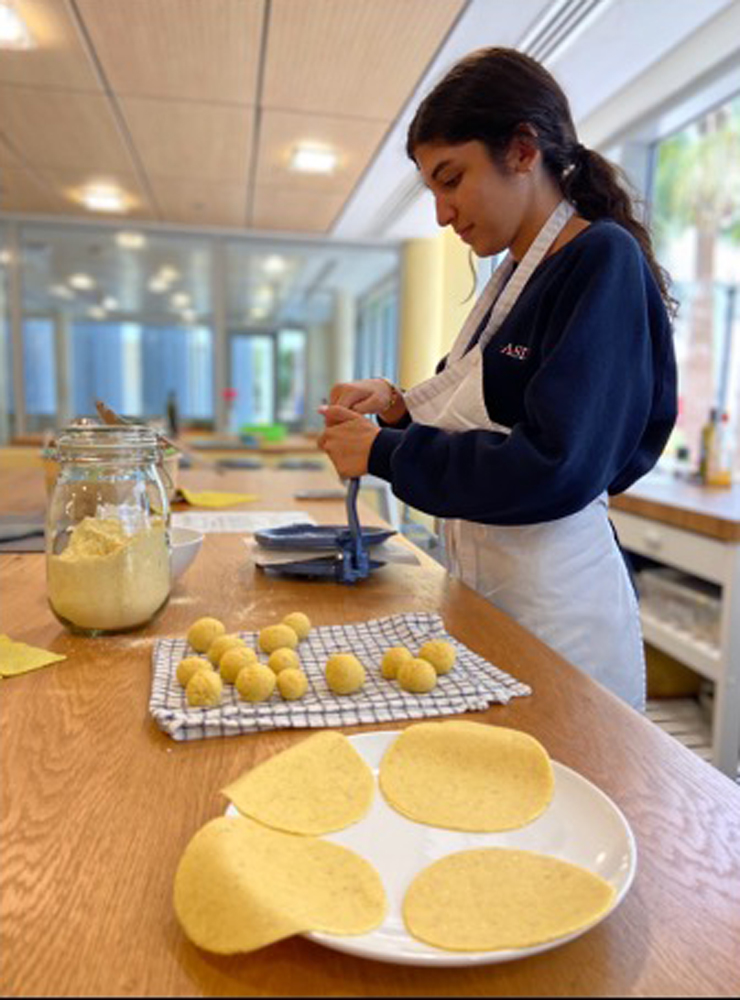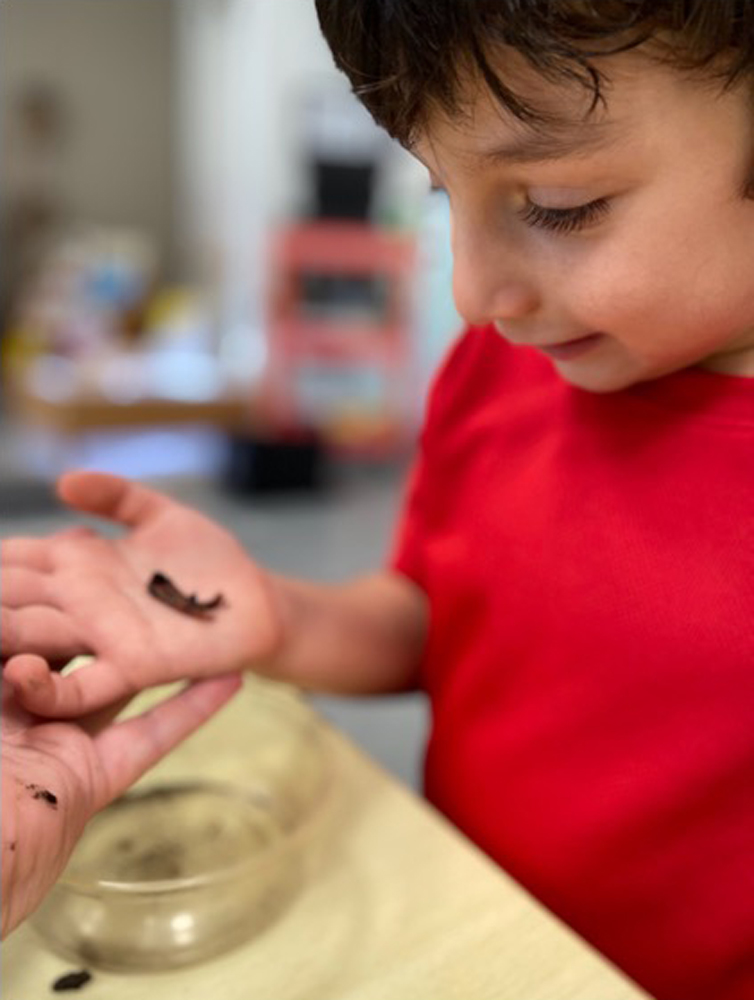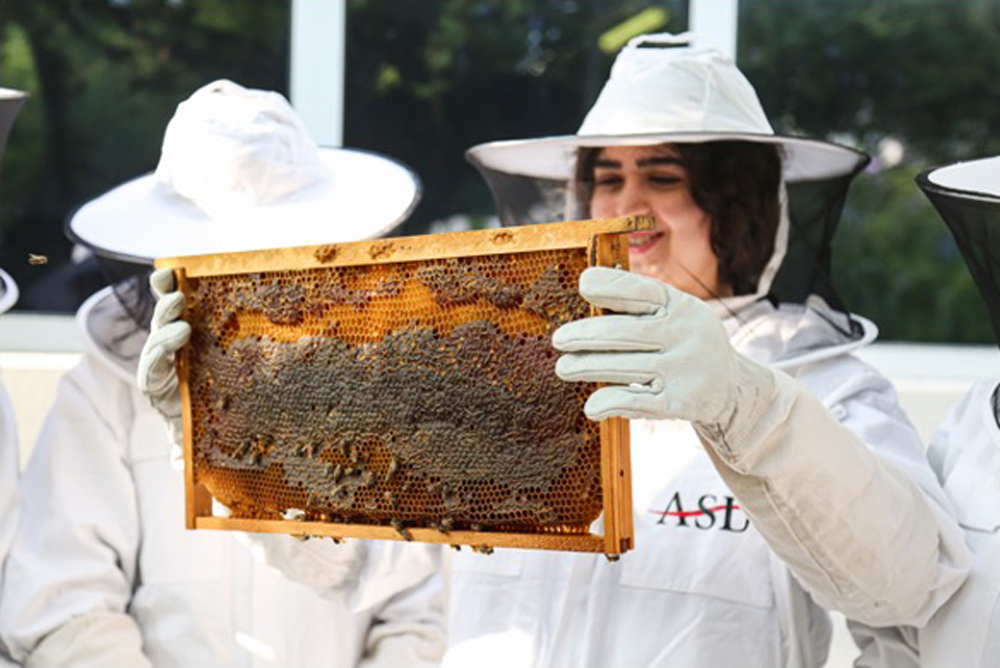
(Photo source: American School of Dubai)
--------------------------------------------------------------
When people hear my job title at the American School of Dubai (ASD), there is always a moment of silence. I like to watch the range of emotions that flit across their faces…confusion, disbelief, then curiosity. What does an edible education coordinator do? In short, I oversee our Edible Education program, which focuses on global issues with food at its center. There is K-12 student engagement with growing, cooking, composting, and/or protecting our pollinators. By design, Edible Education is integrated into curricular lessons of all types and focuses on concepts of organic principles, circular economy, systems thinking, and sustainable choices. Every grade level visits either the garden, kitchen, or apiary throughout the year, often multiple times. The program boasts 30 raised beds in a sustainable garden, a bee garden with six beehives, and a kitchen classroom focusing on engagement, community building, and food education.

In our Edible Education program, food is the conduit to the curriculum. Our program has a hands-on element that makes students immediately engaged and allows them to learn practical, real-life skills like cooking, cleaning, and growing food using organic principles.
Eighth graders explore the concept of polymers and how they’re made chemically. This concept is eloquently displayed with masa harina. When corn is exposed to ash, lime, and water, a chemical change occurs which allows the corn to bind or stick together. This lesson ends with students making fresh corn tortillas alongside a delicious bean filling using many ingredients grown in our garden.

The K1 students learn how to distinguish between living and non-living things, which can be simply reduced to the concept of rotting, as living things decay. This is a natural way for us to talk about food waste, the global issue of food ending up in a landfill, and how we solve this problem with composting and reducing food waste in the first place! This concept becomes visceral as students shriek with fearful delight while holding worms from our vermicomposting station. This fear is quickly replaced with empathy as I name the worms and give them backstories (Justin, a talented singer worm who is incredibly lonely as worms only want to be his friend because he’s famous).
In many of our kitchen and garden classes, parents volunteer to support students. This is especially impactful on the wider community because it shows parents, administrators, coaches, and support staff just how capable kids are, and it allows parents to be kids again as they join in the learning. In the kitchen, specifically, it highlights vegetable-based recipes that kids love. Parents learn that when students cook healthy meals, they are more likely to try them, and cooking in my program gives them specific strategies to eliminate food waste in their own kitchens.
There is a rotating compost bin system in our sustainable garden where over 200 families contribute food waste that turns into a nutrient-rich soil amendment as well as an industrial composter with the capacity to turn 500 kilograms of landscape and food waste into compost. In fact, in addition to the K1 examples, fifth graders and ninth graders also have lessons attached to the compost program. Fifth graders explore the concept of volume and calculate how much compost those bins actually produce given that the decaying process reduces it by 90 percent. The ninth graders come with their history class called Global Issues in Action, where they focus on food for an entire unit and explore concepts such as food access, food justice, food science, and food waste.
Every year, our Edible Education program gets hundreds of visitors from the external community, such as teachers and admin from other schools, ministers from governmental programs, and sustainability champions from all over the world. They all want to know the same thing, “How did you build such a successful program?”
That, my friends, is simple. It’s not my ability to pull 50 ideas out of thin air in a thirty-minute meeting (although, that helps!). It’s not the fact that I grew up on a farm in Montana in the United States. It’s not because I was a middle school humanities teacher for most of my career. And it’s not the fact that I am, indeed, a very good cook. It’s simply the fact that my school has a dedicated full-time position called Edible Education coordinator and has the innovative foresight to nurture such a position.
Many schools that want programs like what we have at the American School of Dubai, might offer stipends to an already overstretched teacher who wants to create raised beds in a corner of their campus. Funding is secured, the program gets off the ground, a successful harvest is pulled in, and the community celebrates. Still, the inevitable is bound to happen. With the transient nature of life in the international school setting, the teacher eventually moves on and the raised beds fall into a state of disrepair until another energetic teacher passionate about sustainability comes along.

The reason Edible Education at ASD really works and why my school community is so invested in my program is simply because my entire day is spent supporting teachers in connecting curriculum to my spaces. I find resources for them, I set up and co-teach classes in spaces where most teachers feel outside their comfort zone. I reach out to food experts that students connect with. I research projects that could potentially turn a disengaged kid into an excited one! In short, I make sustainability accessible by using food as a medium. And I take the parents along by including them in this journey.
My position falls under the teacher and learning section of our school where I’m identified as an integrator. I work closely with an amazing service-learning coordinator, Laurence Myers, who supports my work with systems-thinking panache. Often our work with teachers overlaps, and what starts as a visit to the garden to look at compost, turns into a year-long service-learning project for a grade level. Laurence’s position allows me to never feel like I’m fighting the sustainability battle alone. Teachers working in sustainability are often lone wolves in their schools, and I’ve got to be honest, it’s a desolate way to work.
With the state of the world today, I don’t understand why more schools don’t invest in positions like mine. These positions (and those of service-learning coordinators with whom we work alongside) have the potential to disrupt an entire generation of complacency and apathy. They have the ability to empower all community members to be changemakers, starting with the food they choose to put in their bodies.
I invite any teachers, administrators, or staff who want to create a program like this to reach out to me. We can literally and figuratively plant the seeds to grow Edible Education spaces all over the world.
--------------------------------------------------------------
Sandra Carden oversees the Edible Education program at the American School of Dubai which focuses on global issues with food at its center, through active student engagement with growing, cooking, composting, or protecting pollinators.
Email: [email protected]
Website: https://www.instagram.com/asd_sustainable_garden/